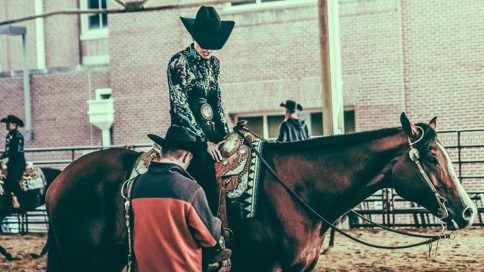More Tips from Stephanie Lynn
- Schedule meetings to discuss important matters. If you have questions about your billing, veterinarian care, future shows, goals or problems you are encountering in your riding, schedule a time to talk about it. It is a bad idea to try to catch your trainer with a few minutes at the barn. You may be interrupted by another rider/customer or your trainer simply may not have the time or mindset to discuss the matter. Schedule regular chats, bring coffee or a Coke and ask to sit down and talk.
- Find out the trainer’s favored mode of communication. I am amazed at how young people communicate, they text, they Facebook message but rarely do they pick up the phone and call. Ask your trainer how they like to communicate then respect their wishes. Do not make evening calls unless they ask you to. The same goes for weekends or holidays. If your trainer calls you at seven in the evening it is okay to call him or her at seven in the evening. Mirror their mode of communication.
- Don’t gripe about your trainer or stable mates to other customers. If you have a problem with your trainer, discuss it with your trainer. Whether it is a question about care or a concern about your progress, a discrepancy over procedure or a problem with another client, talk to your trainer.
- Be the positive one. It is so refreshing to see positive people pull up to the barn. They are a joy to work with and for and trainers look forward to their arrival. It is difficult not to dread the arrival of someone who is never satisfied or always finding fault. Positive energy is reflected in all that goes on around you. Be the creator!
- Be helpful. Help unpack the trailer, clean water buckets, sweep the barn or empty the wheelbarrow. While your trainer may find some menial tasks cathartic there are plenty of places where an extra hand is greatly appreciated. Unfortunately, it is usually not with the fun stuff. Be helpful – to anyone who needs it – another client, your trainer or your trainer’s hired help.
- Respect the trainer’s employees. It is important that your trainer feel you respect the people he or she has put in place to complete their program. If you see something you do not like, instead of talking around the barn, speak directly to your trainer. Discuss your concerns with your trainer then remember that everyone deserves respect.
- Help yourself. Many trainers offer full service programs. But that does not make you inept. Do not expect your trainer to wait on you hand and foot even if that is a service your trainer likes to employ. Offer to saddle your horse, clean him up after your ride or hold him while he is being clipped. Even if your offer is denied, do as much on your own as you can – it will make you a more complete rider and more competitive in the show pen.
- Take responsibility. Horse trainers cannot program your horse to autopilot their way around the arena. Horses are living beings with minds of their own that look to their rider for comfort, trust and direction. Don’t pass the buck or place blame on someone or something else. Instead of being defensive, own up to your mistakes, figure out what needs to be changed, dig in and make it right the next time.
- Be a good listener. Stephen R Covey in The 7 Habits of Highly Effective People, said, “Most people do not listen with the intent to understand; they listen with the intent to reply.” Listen so that you may understand. Let your trainer finish without interruption so that you may hear what he or she is saying. No buts….
- Manage your emotions. Horse shows can be stressful for everyone. Understanding your emotions prevents them from ruling your actions. People who are self-aware are usually very confident. They take an honest approach to their feelings and actions and do not let their emotions get out of control. Here again, taking responsibility for your actions goes a long way to keep relationships good.
As with all great partnerships – there must be give and take on both sides to keep solid trainer/client relations. Both parties must feel safe in their environment, both parties must understand and anticipate potential obstacles and work together to find solutions. Through time, shared adventures and overlapping experiences, great partnerships continue to strengthen and provide a lifetime of reward. Along the way, the partners gather trophies, ribbons and great tales that celebrate true friendship.






